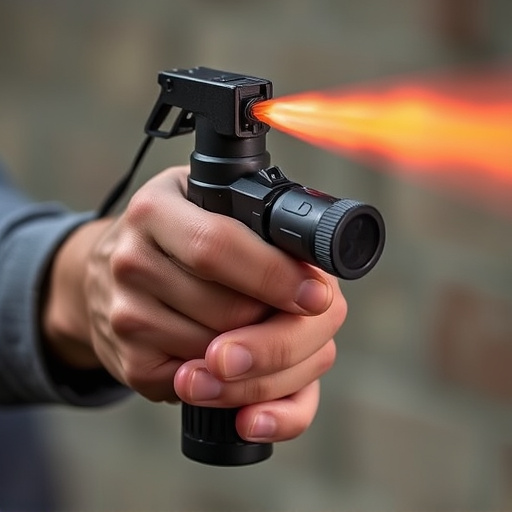Pepper spray, a tool for both law enforcement and individual self-defense, is regulated by varying Pepper Spray Laws by State across the US. These laws control who can possess, use, and distribute pepper spray, with restrictions on strength and composition to ensure safety. While federal guidelines exist, state regulations predominate, ranging from stringent rules in states like California and New York to more permissive laws allowing open carry. Understanding these diverse laws is crucial for both citizens (seeking legal self-defense) and law enforcement officers (maintaining public order) to avoid legal issues and promote responsible use during volatile situations.
“Uncovering the Power of Pepper Spray Canisters: A Comprehensive Guide. In today’s dynamic world, understanding riot control tools like inflammatory spray canisters is paramount. This article offers a detailed look at pepper spray, delving into its mechanics, legal landscape, and state-specific regulations. From the streets to various gatherings, knowing the rules and responsible use can be a game-changer. Explore our comprehensive overview on ‘Understanding Pepper Spray Canisters’ and gain insights into the ‘Legal Framework’ and ‘State-Specific Regulations’ to ensure safety and compliance with ‘Pepper Spray Laws by State’.”
- Understanding Pepper Spray Canisters: A Comprehensive Overview
- Legal Framework: Pepper Spray Laws Across the United States
- State-Specific Regulations and Considerations for Carrying Pepper Spray
- Safety and Responsible Use: Tips for Effective Riot Control
Understanding Pepper Spray Canisters: A Comprehensive Overview
Pepper spray canisters, also known as oleoresin capsicum (OC) spray, are powerful tools used for riot control and personal defense. These devices emit a potent chemical agent that irritates the eyes, respiratory system, and skin, temporarily incapacitating individuals and providing crucial time in high-risk situations. Understanding pepper spray is essential, especially when considering its legal aspects, known as Pepper Spray Laws by State. Each state in the US has unique regulations regarding the possession, use, and distribution of pepper spray, reflecting a delicate balance between individual rights and public safety.
The specific laws vary widely, dictating who can legally carry pepper spray, where it can be used, and under what circumstances. Some states allow law enforcement agencies to employ pepper spray for crowd control during demonstrations or civil unrest, while others restrict its use primarily to authorized personnel for self-defense. Additionally, there are restrictions on the strength of the spray and the type of chemicals allowed, ensuring that these tools remain effective yet safe. Understanding Pepper Spray Laws by State is paramount for both individuals seeking legal protection and law enforcement agencies tasked with maintaining public order.
Legal Framework: Pepper Spray Laws Across the United States
In the United States, the legal framework surrounding riot control inflammatory spray canisters, commonly known as pepper spray, varies significantly from state to state. While federal laws provide some guidelines for law enforcement use of force, including pepper spray, individual states have their own regulations and restrictions. Pepper Spray Laws by State are critical in determining when, where, and how this non-lethal weapon can be employed.
Some states, like California and New York, have stringent rules governing the sale, possession, and use of pepper spray. These laws often mandate specific training for law enforcement officers and set strict standards for self-defense use. In contrast, other states have more lenient regulations, allowing open carry or limited restrictions on usage. Understanding these Pepper Spray Laws by State is crucial for both citizens and law enforcement to ensure compliance and promote public safety during situations that may escalate into riots or civil unrest.
State-Specific Regulations and Considerations for Carrying Pepper Spray
In the United States, the laws surrounding pepper spray, or riot control inflammatory spray canisters, vary significantly from state to state. Understanding Pepper Spray Laws by State is crucial for individuals looking to carry self-defense equipment. Some states have relatively permissive regulations, allowing citizens to possess pepper spray without a license for personal protection. Conversely, other states have stringent requirements, including mandatory training and permits.
When considering the carrying of pepper spray, it’s essential to familiarize yourself with local laws. For instance, some states prohibit its use against specific groups like law enforcement officers or animals. Additionally, there may be restrictions on the type and amount of pepper spray allowed, as well as where and how it can be stored. Staying informed about these State-Specific Regulations ensures compliance and promotes responsible use.
Safety and Responsible Use: Tips for Effective Riot Control
The safe and responsible use of riot control inflammatory spray canisters is paramount, especially considering the legal implications that come with their deployment. In many jurisdictions, pepper spray laws by state dictate how and when these devices can be employed. Understanding local regulations is crucial for law enforcement agencies and those in charge of public safety to ensure compliance and minimize potential harm.
When handling riot control spray, training and education are key. Officers must be taught proper usage techniques, including safe distances, aiming, and the recognition of different types of pepper spray. Ensuring the equipment is maintained and stored correctly is also essential to prevent accidental discharge or degradation of the product over time. Responsible use involves targeting only the assailant(s), minimizing impact on bystanders, and considering environmental factors like wind direction.
In conclusion, understanding the legal landscape surrounding pepper spray canisters, as outlined in our discussion of Pepper Spray Laws by State, is paramount for both individuals seeking self-defense options and law enforcement agencies tasked with riot control. The responsible use of these tools, as emphasized in our safety tips, ensures their effectiveness while mitigating risks. Navigating the state-specific regulations is crucial to ensure compliance and promote public safety during high-pressure situations.
